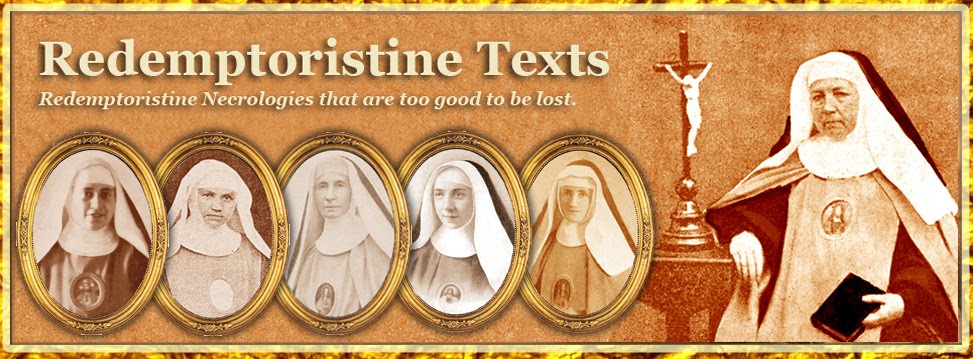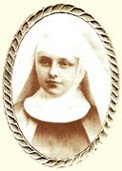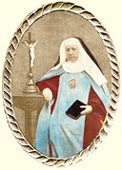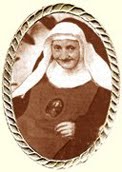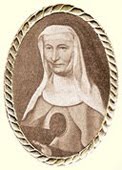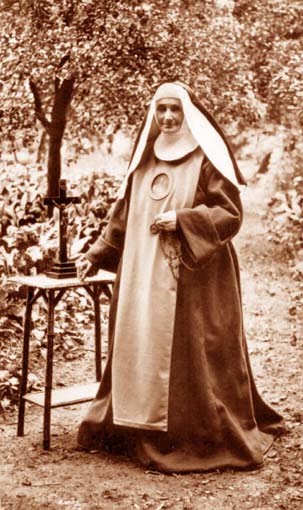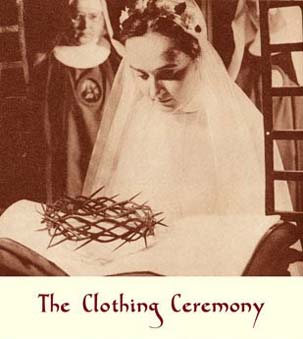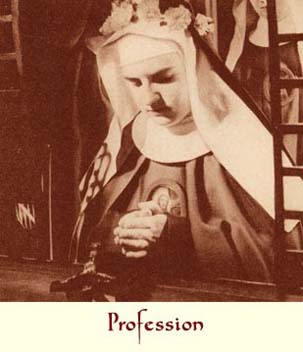The characteristic devotion of this good Sister was her devotion to Saint Alphonsus.
Josephine-Jeanne de Mortier was born in Brussels of very Christian parents, on 8th June 1846. She shared the lessons that tutors gave her brothers and sisters at her home. Her bright, lively and affectionate character made her beloved by all those who knew her. Her piety developed with her age, and as she had only good examples before her eyes, this good child never knew evil. – She devoted herself with a great deal of zeal to propagating the Work of the Holy Childhood, and spared neither pain nor efforts for her dear little Chinese (this is what she loved to call them). She also occupied herself with a great deal of charity in teaching the catechism each Sunday to the little children of the poor, and her patience found much opportunity for exercise.
The divine Saviour, who cherished this pure and innocent soul, and destined her to bear the crown of Virgins eternally, hastened to withdraw her into His sanctuary in order to win this crown that she was to receive while still young.
Since her childhood, Josephine had been under the direction of the Redemptorist Fathers. She loved nothing but Saint Alphonsus, she said, so she soon thought to become his daughter and went to present herself to the Monastery of the Redemptoristines of Bruges in the month of June 1866. The Reverend Mother Marie-Philomena of the Divine Providence recognized the precious qualities of her postulant very quickly and received her as a present from Saint Alphonsus himself. She made her entry on 15th August 1866. She immediately bore herself with fervour in all the exercises of the religious life. She would go to choir with a very special joy, and she so much loved chanting the office that when the state of her health deprived her of this blessing, this sacrifice drew many tears from her. Her devotion to the Blessed Sacrament was such as to make her find the moments that she was able to spend at the foot of the holy Tabernacle much too short. Her love for prayer made her employ this holy exercise all the time that she could give to it. She prepared for it carefully and made great progress in it.
She was very bright, but out side the times of recreation, she greatly loved silence, because she felt the good it does to the soul who seeks to be united to her God. Her charity made her ingenious in helping others. She did it with such a good heart that you could see her jump for joy when a work was entrusted to her. – Her heart was completely devoted to her Superiors. She had entire confidence in them. She loved them and obeyed them like a docile and affectionate child. A word on their part was sufficient to tranquillise her in her pains.
Josephine, when her educandate had finished, received the holy habit on 20th August 1867, and at the same time the name of Sister Marie-Paul of the Child Jesus. She passed the time of her novitiate with great fervour and made her holy vows on 20th August 1868. After a year, her health had greatly altered. From an illness that she had suffered a feebleness remained that degenerated into consumption. The dear little Sister, always courageous, finally, on 20th September, had to descend to the infirmary. The illness made rapid progress, and she was soon reduced to not being able to walk alone, so great was her weakness.
However she preserved her pleasant character, and was pleased with everything and never offered a complaint about her sufferings or the privations that resulted from her illness. She said: “I accept that I need all my courage so as not to lose patience; but I look at the good Jesus on the cross and then I feel strong and happy to suffer.” – She keenly felt the blessing of dying in religion: “I understand it even better now than on the day of my Profession,” she said, “and I renew my holy vows at least fifty times a day. Oh, what a blessing to die in the convent, where everything speaks to me of God, and where I can still take communion so often!”
One single thing hurt her. It was leaving her good Superior, Mother Marie-Philomena. Whenever she thought of it her tears would flow, but the thought of seeing her again one day in heaven dried them up very quickly. A word from the Reverend Mother made her forget all her sufferings. She loved to speak with her of heaven and the blessing of chanting the praises of the Lord there. Sister Marie Paul would then rally and exclaim: “If I love music so much here below, what will happen then in Paradise?” But this moment delayed too long for the vivacity of her desires – she found the time very long, and she had to make acts of resignation to await the moment indicated by the divine will. – One day she wanted to see the novices, her companions, say goodbye to them, and give a picture to each one of them as a souvenir. She promised to pray for them in Paradise and made them promise her to pray a great deal for her after her death.
On the day of the Immaculate Conception 1868, she asked for the Consecration to the Sacred Heart of Jesus to be made in the infirmary just as it was being made in public that same day. The dear child offered herself to the divine Heart as a victim of expiation. She offered her life for poor sinners, for the needs of the Church, and to obtain graces for the community. On the eve of her death, she asked if the blessed candle was in the infirmary, because she felt the moment approaching. On 10th December she received Holy Communion once more and passed the morning quite peacefully. About twelve thirty, the confessor gave her the last absolution. She was perfectly conscious and smiled when she saw the Sisters praying round her bedside. She looked confidently at the picture of the Blessed Virgin and in this way, without a moment of agitation, without even a sigh, she peacefully rendered her soul to God.
The divine Saviour, who cherished this pure and innocent soul, and destined her to bear the crown of Virgins eternally, hastened to withdraw her into His sanctuary in order to win this crown that she was to receive while still young.
Since her childhood, Josephine had been under the direction of the Redemptorist Fathers. She loved nothing but Saint Alphonsus, she said, so she soon thought to become his daughter and went to present herself to the Monastery of the Redemptoristines of Bruges in the month of June 1866. The Reverend Mother Marie-Philomena of the Divine Providence recognized the precious qualities of her postulant very quickly and received her as a present from Saint Alphonsus himself. She made her entry on 15th August 1866. She immediately bore herself with fervour in all the exercises of the religious life. She would go to choir with a very special joy, and she so much loved chanting the office that when the state of her health deprived her of this blessing, this sacrifice drew many tears from her. Her devotion to the Blessed Sacrament was such as to make her find the moments that she was able to spend at the foot of the holy Tabernacle much too short. Her love for prayer made her employ this holy exercise all the time that she could give to it. She prepared for it carefully and made great progress in it.
She was very bright, but out side the times of recreation, she greatly loved silence, because she felt the good it does to the soul who seeks to be united to her God. Her charity made her ingenious in helping others. She did it with such a good heart that you could see her jump for joy when a work was entrusted to her. – Her heart was completely devoted to her Superiors. She had entire confidence in them. She loved them and obeyed them like a docile and affectionate child. A word on their part was sufficient to tranquillise her in her pains.
Josephine, when her educandate had finished, received the holy habit on 20th August 1867, and at the same time the name of Sister Marie-Paul of the Child Jesus. She passed the time of her novitiate with great fervour and made her holy vows on 20th August 1868. After a year, her health had greatly altered. From an illness that she had suffered a feebleness remained that degenerated into consumption. The dear little Sister, always courageous, finally, on 20th September, had to descend to the infirmary. The illness made rapid progress, and she was soon reduced to not being able to walk alone, so great was her weakness.
However she preserved her pleasant character, and was pleased with everything and never offered a complaint about her sufferings or the privations that resulted from her illness. She said: “I accept that I need all my courage so as not to lose patience; but I look at the good Jesus on the cross and then I feel strong and happy to suffer.” – She keenly felt the blessing of dying in religion: “I understand it even better now than on the day of my Profession,” she said, “and I renew my holy vows at least fifty times a day. Oh, what a blessing to die in the convent, where everything speaks to me of God, and where I can still take communion so often!”
One single thing hurt her. It was leaving her good Superior, Mother Marie-Philomena. Whenever she thought of it her tears would flow, but the thought of seeing her again one day in heaven dried them up very quickly. A word from the Reverend Mother made her forget all her sufferings. She loved to speak with her of heaven and the blessing of chanting the praises of the Lord there. Sister Marie Paul would then rally and exclaim: “If I love music so much here below, what will happen then in Paradise?” But this moment delayed too long for the vivacity of her desires – she found the time very long, and she had to make acts of resignation to await the moment indicated by the divine will. – One day she wanted to see the novices, her companions, say goodbye to them, and give a picture to each one of them as a souvenir. She promised to pray for them in Paradise and made them promise her to pray a great deal for her after her death.
On the day of the Immaculate Conception 1868, she asked for the Consecration to the Sacred Heart of Jesus to be made in the infirmary just as it was being made in public that same day. The dear child offered herself to the divine Heart as a victim of expiation. She offered her life for poor sinners, for the needs of the Church, and to obtain graces for the community. On the eve of her death, she asked if the blessed candle was in the infirmary, because she felt the moment approaching. On 10th December she received Holy Communion once more and passed the morning quite peacefully. About twelve thirty, the confessor gave her the last absolution. She was perfectly conscious and smiled when she saw the Sisters praying round her bedside. She looked confidently at the picture of the Blessed Virgin and in this way, without a moment of agitation, without even a sigh, she peacefully rendered her soul to God.
This necrology is translated from Fleurs de l'Institut des Rédemptoristines by Mr John R. Bradbury. The copyright of this translation is the property of the Redemptoristine Nuns of Maitland, Australia. The integral version of the translated book will be posted here as the necrologies appear.
